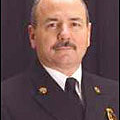Lumping all firefighters into a category is a generalization of course. There are more than a few firefighters devoted to prevention efforts. They have witnessed one too many personal tragedies - and have a genuine desire to do something constructive about it. But wouldn't you admit that's more the exception than the rule? Consider the grizzled veterans who have spent a career fighting fire and loving it. Doesn't make them bad people. That's humor in case you were wondering.
But it does highlight the sometimes conflicting roles that firefighters face today. And so I've come to the conclusion that many firefighters need to be convinced that having a role in prevention won't take away their job security. And it will help improve public safety. This is true for three simple reasons. First, we will never prevent all the fires from occurring. Second, the firefighters are in the best position to meet people right where they live. And third, they are the most credible source for prevention information the fire service has.
The first question firefighters must ask themselves is: did I sign on to perpetuate a problem, or to help solve it? Not one of them can deny the pain and suffering that fires cause - no matter how much adrenaline is pumping through their system at a good working fire. Still makes their stomachs churn to think of someone trapped inside. And everyone admits it is a terrible waste. Still, prevention is often undervalued.
That value set is endemic within the fire service. Even the leaders of the fire service have it. What do we spend most of our time and resources on emergency response? Because it's the most important thing we do? I think we have a lot of important things to do to make our communities safer. We're just used to emergency response because that is how we've solved problems for sooooooo long!
And firefighters train on that. Day after day (except for those pesky emergency medical classes). And the hazardous materials classes, the special rescue classes, the weapons of mass destruction classes and the myriad of other topics modern firefighters are supposed to absorb. Top priority - and usually first out of the box - the day to day fire operations.
So why push for extra duty when firefighters are busy enough and need more resources just to handle the problems they face day to day? See number two and three above.
Firefighters are our best eyes and ears about problems that can be prevented - and they are the most credible voice for prevention within the community. Ask anyone - go ahead I double dog dare you. If you actually make contact with your community - you know, the ones who pay the taxes - they'll tell you they love firefighters. And that they listen to them (well most times - getting tax levies passed can be a real problem).
So as a firefighter, getting involved in public education programs not only produces great public relations - it is actually helping to make the community safer. But wait, there's more! (not steak knives).
Firefighters, and their prevention partners - have a vested interest in other aspects of prevention too. I've already mentioned fire department access. Is your department making sure that all new development comes with an adequate way to reach it in the event of an emergency? And how about water supply? Pretty important once the fire starts right? Then there are the sprinkler and alarm systems. Knowing how they operate is very important for firefighters - especially when they are not operating properly. The false alarms are a pain in the behind - so knowing how to put the system back in service - and how to get your prevention staff involved in fixing the problems (if you have that luxury) is important too.
Then there are issues of sheltering in place for the ADA type folks who can't escape. Exit routes and whether they actually work or not will be critical in the fire situation - so don't you think it's a good idea to check them out in advance? Don't all pre-fire plans have an element (or at least an opportunity) of prevention within?
So, you may not think it's your responsibility - but people really do pay attention when firefighters speak. The listen when you say that exits are inadequate. That water supply is inadequate. That alarms must be practical and work. That people must be able to understand the difference between false alarms and the real thing. That fire sprinklers really do work. We can't have forgotten the lessons of the One Meridian fire in Philadelphia's already. And we (fire service leaders) must listen when our firefighters tell us where the problems are - so we can work together to fix them. They're on the front line and they know about them before we do!
There is more than enough work to go around. And we won't prevent them all. But I have a hunch we can do better than we have. And firefighters are a critical part of strengthening our prevention efforts!
About the Author
